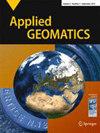Analysis of using the modified centring plates with eccentric points for geodetic measurements
Abstract
Many engineering structures require high measurement accuracy. Their displacement and deformation are determined from the results of special measurements. For the measurements to be accurate, a properly constructed and marked survey network is necessary. The long-term stability of survey points can be ensured by marking (installing) them on solid rock or special triangulation pillars. Accurate and repeatable instrument positioning and premarking over the points is ensured by centring plates. Centring plates with eccentric points can be used when a survey involves several instruments. The article presents the results of measurements and computations done using centring plates with eccentric points. The measurements were conducted in a metrology laboratory. The sought points were premarked with prisms and reflective targets. The measuring methods were angular intersection, linear intersection, and linear-angular measurements. We computed coordinates for the measured points, and the results were compared to their known directory values. The results demonstrate that centring plates with eccentric points can be employed in engineering surveys.

 求助内容:
求助内容: 应助结果提醒方式:
应助结果提醒方式:


